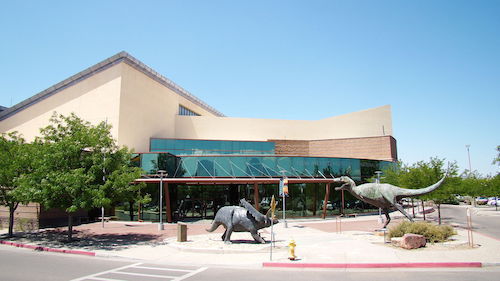Discovery Institute's Blog, page 183
February 24, 2015
To Explain the Origin of Animal Body Plans, Here's What May Be the Most Inadequate Proposal Yet

We've seen some pretty dead-on-arrival explanations for the origin of new body plans in the Cambrian explosion, but this one takes the cake. Researchers at CNRS in France (Centre national de la recherché scientifique) have been experimenting with rubber sheets to explain how the first bilateral body plans might have evolved:
A simple physical mechanism that can be assimilated to folding, or buckling, means that an unformed mass of cells can change in a single step into an embryo organized as...
February 23, 2015
Ask an Embryologist: Genomic Mosaicism

A reader writes to ask:
In a recent ENV post, Casey Luskin observed that humans have a "few thousand" different cell types. Here is my simple question: Does the DNA sequence in one cell type differ from the sequence in another cell type in the same person? Do we really know that the DNA sequence in one person is the same all over his body? I am inclined to guess that the answer is: "No one is quite sure."
The simple answer is: We now know that there is considerable variation in DNA sequences...
Does Science Deserve Credit for Moral Progress?

I'm always amused by the assertion that advances in contemporary morality are somehow thanks to science.
Michael Shermer'scolumn in Reason will serve as an illustration. He notes that IQ scores have been rising and correlates this with a higher morality, presuming that one leads necessarily to the other.
Shermer categorizeshuman thinking as either "concrete," which he sees as regressive and the cause of brutality,or "abstract," which he claims to be "scientific" and supposedly is more progress...
Looking at Nature with an Engineer's Eye
Here are two examples of researchers looking for "design principles" in living organisms, showing that an engineering focus leads to scientific progress.
Cell Replication as System Engineering
The job of an efficiency expert is to find better ways to get more things done in less time at less cost. From "Taylorism" in the early 20th century, through "Operations Research" in the days of World War II, to "systems engineering" today, efficiency expertise has grown into an essential discipline for...
February 22, 2015
Hylomorphism as a Metaphysic for Intelligent Design Science
Editor's note: We are pleased to welcome JT Bridges to the pages of ENV. Dr. Bridges is a professor of philosophy at Southern Evangelical Seminary in North Carolina.
 Catholic theologian Thomas Aquinas is popularly known for his "Five Ways" of demonstrating God's existence. (See, for example, Michael Egnor's recent article here, "Lawrence Krauss, Eric Metaxas, and Aquinas' Fifth Way.") But Aquinas in many of his writings also provides a detailed philosophical account of God's created order and...
Catholic theologian Thomas Aquinas is popularly known for his "Five Ways" of demonstrating God's existence. (See, for example, Michael Egnor's recent article here, "Lawrence Krauss, Eric Metaxas, and Aquinas' Fifth Way.") But Aquinas in many of his writings also provides a detailed philosophical account of God's created order and...
February 21, 2015
Shock: A Darwinian Biologist Notices that Evolution Is Irrelevant to Medical Research

Darwinist PZ Myers is shocked that medical researchers aren't invoking "evolution" regularly in their research papers:
It's not just creationists!
It's also MDs who avoid the "E" word. A survey of the literature found an interesting shift in usage:
The results of our survey showed a huge disparity in word use between the evolutionary biology and biomedical research literature. In research reports in journals with primarily evolutionary or genetic content, the word "evolution" was used 65.8%...
February 20, 2015
Climate Change and the Poor: Two Events, One Timely Topic, Next Week in Seattle
Climate change is the major environmental issue in the public arena today,but as we seek to save the planet,are we in danger of harming the poor and vulnerable?If you're in the Seattle area, join us next week as we explore this question over two events.
Come see a free screening of Blue, a provocative documentary that follows one young man's journey to challenge accepted orthodoxy in the area of the environment in light of both the empirical evidence and his Christian faith.
The time is Monda...
What a Single Choice of Words Tells You: Walker Was "Very Accepting" in Science Class?

Time Magazine went and interviewed Governor Scott Walker's high school science teacher, Ann Serpe, age 73. This, of course, was occasioned by the still roiling discussion of his decision to "punt" in response to being asked whether he believes in "evolution" (the term was undefined in the question):
What would Walker have learned in high school? "We taught the theory of evolution, and human evolution, as a prerequisite to understanding biological classification. I went out and looked at my bi...
"Swarm" Science: Why the Myth of Artificial Intelligence Threatens Scientific Discovery
In the last year, two major well-funded efforts have launched in Europe and in the U.S. aimed at understanding the human brain using powerful and novel computational methods: advanced supercomputing platforms, analyzing peta- and even exabyte datasets, using machine learning methods like convolutional neural networks (CNNs), or "Deep Learning."
At the Swiss Federal Institute of Technology in Lausanne (EPFL), for instance, the Human Brain Project is now underway, a ten-year effort funded by t...
New Mexico Science Museum Would Rather Sponsor No Darwin Day Events than a Balanced and Objective One

Last year we reported on a situation at the New Mexico Museum of Natural History and Science (NMMNHS). The state-run museum co-sponsored its 2014 Darwin Day Events with local atheist groups, and used the events to bash religion. When concerned local citizens inquired, museum staff sought to cover up evidence of their work with the atheist groups. Thankfully, those citizens had the foresight to file a public records request, seeking documents that could not be whitewashed -- documents that to...
Discovery Institute's Blog
- Discovery Institute's profile
- 15 followers





